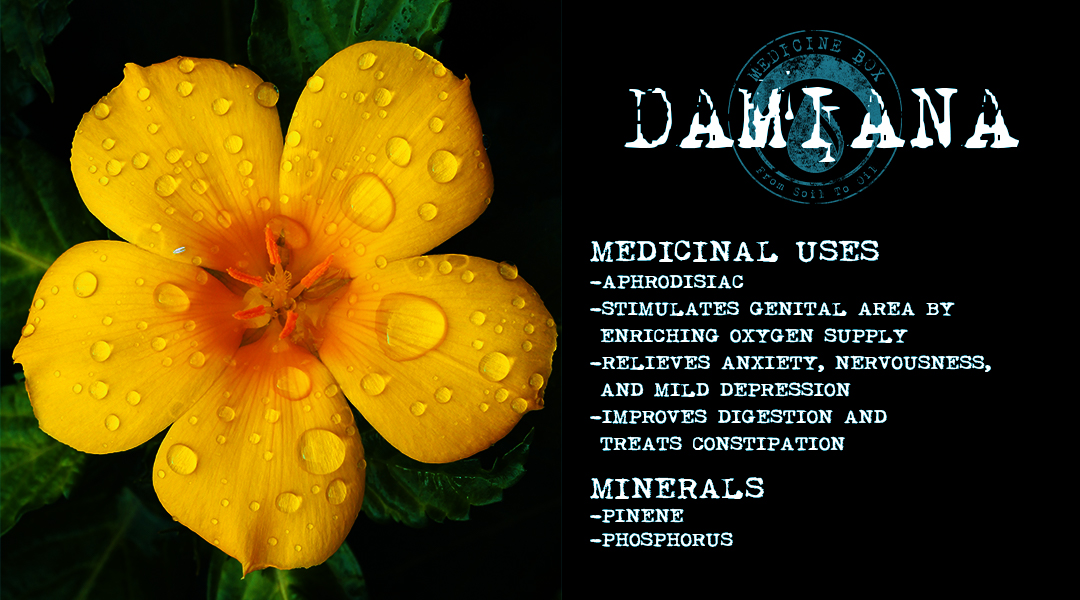The Health Benefits of Damiana
Damiana (Turnera diffusa, Turnera aphrodisiaca) is a wild shrub native to Texas, Mexico, South and Central America, and the Caribbean. The dried leaves are used medicinally and are believed to have an aphrodisiac effect for both men and women. In alternative medicine, damiana is also used for asthma, anxiety, depression, headache, and menstrual disorders, though supporting evidence for this is lacking.1
:max_bytes(150000):strip_icc():format(webp)/Turnera-diffusa-resized-569fee025f9b58eba4adf916.jpg)
Health Benefits
Despite centuries of use in folk medicine, few scientific studies have investigated damiana for the treatment or prevention of any disease or condition. The majority of research that does exist on the effects of damiana is limited to animal and laboratory studies, the results of which cannot be reliably applied to humans.
Improved Sexual Function

Although damiana is widely promoted as a sexual stimulant and aphrodisiac, there is not sufficient scientific support for this.
A 2009 study on rats found that damiana helped sexually exhausted male rats rebound for a second ejaculation. According to the study authors, the results support the use of the herb as an aphrodisiac; they suspect specific flavonoids in the herb may be responsible for this effect.2
Other research suggests the herb may improve women’s sexual enjoyment as well. Two studies found an herbal preparation containing damiana improved women’s overall satisfaction with their sex life.
Two studies investigated the supplement ArginMax for Women, a proprietary nutritional blend of ginseng, ginkgo, damiana, L-arginine, multivitamins, and minerals.
The first study, published in the Journal of Sex and Marital Therapy, included 77 women given either ArginMax or a placebo for four weeks. At the end of the study, 73% of women given the herbal formula reported an increase in sexual desire, a reduction of vaginal dryness, a greater frequency of sexual intercourse and orgasm, and enhanced clitoral sensation compared with 37% of the placebo group.3
The second study examined ArginMax in women in various stages of life (premenopause, perimenopause, and postmenopause). While all groups reported higher levels of sexual desire and satisfaction, researchers noted improvements in the postmenopausal were quite significant. In addition, the supplement did not impact estrogen levels, and the study authors noted ArginMax may be a better alternative than hormone-replacement therapy for older women who seek to increase their libido.4
Notably, researchers involved in both studies could not definitively say whether damiana on its own would improve sexual function in women or if works synergistically in combination with other herbs.
Appetite Suppressant

Damiana has been studied as a potential weight-loss tool. In a 2013 study published in the journal Appetite, women who were given an herbal formula containing damiana, yerba maté, and guarana plus an inulin-based soluble fermentable fiber 15 minutes before meals ate significantly less food by volume and calories compared to a placebo. Subjects who took the herbs but not the added fiber also consumed fewer calories. According to the study authors, the herbal combination produced a robust, short-term decrease in appetite.
An earlier study found the combination damiana, yerba maté, and guarana delayed gastric emptying by an additional 20 minutes and decreased the time it took participants to feel full. After 45 days of taking the supplement daily before the main meal of the day, subjects lost an average of 11 pounds more than those taking a placebo. Those who continued to take the supplement for a year maintained that weight loss.
While this research shows promise for weight management, the study authors could not say with certainty if damiana suppresses appetite on its own. More research is needed before damiana can be recommended as a weight loss aid.
Possible Side Effects
Damiana is generally regarded as safe, but high consumption (200 grams of damiana extract) has been linked to serious adverse reactions including convulsions and symptoms similar to rabies or strychnine poisoning.7
Damiana may lower blood sugar and should be taken with caution in people with diabetes who take insulin or other blood-sugar–lowering drugs. Damiana should not be taken in the two weeks prior to surgery.
The safety of damiana has not been established in pregnant and breastfeeding women, so it should not be taken by these individuals.
Damiana has no known moderate to severe interactions with other medications, though some mild interactions have been reported. If you are taking any prescription drugs, check with your doctor or pharmacist before taking this or any herb.7
Selection, Preparation, & Storage
Damiana is sold in capsule, liquid extract, and tea forms at health food stores and shops specializing in supplements and herbs. Damiana is also included in other herbal products marketed for both weight loss and libido enhancement.
There is no standard dosage for damiana at this time. Follow the directions on the packaging.
Dietary supplements are not regulated by the U.S. Food & Drug Administration (FDA). As such, it’s helpful to look for a trusted, independent, third-party seal on the label, such as U.S. Pharmacopeia, NSF International, or ConsumerLab. This does not guarantee effectiveness or safety, but does reassure you that what is on the label is actually what is in the product.
Common Questions
Isn’t damiana illegal in the United States?
Damiana is legal in all but one of the 50 states. It was banned in Louisiana in 2005, along with 40 other plants, after allegedly being included in preparations of synthetic cannabis, also known as spice. In high doses, damiana may cause hallucinations. Smoking and inhaling damiana is not recommended.
What does damiana tea taste like?
Damiana tea has a bitter taste that some people find unpleasant. You can mix damiana with other herbal teas, such as ginger or blackberry, to make it more palatable. It is also included in other tea blends, such as Mountain Rose Herbs Love Tea, in which it is mixed with cacao, rose petals, cinnamon, orange peel, and vanilla.
What is damiana liqueur?
Damiana liqueur is a light, herbal-based liqueur made from the dried leaves and stems of the damiana herb. Sometimes used in place of triple sec in margaritas, it is believed to have been used in the original margarita recipe.






